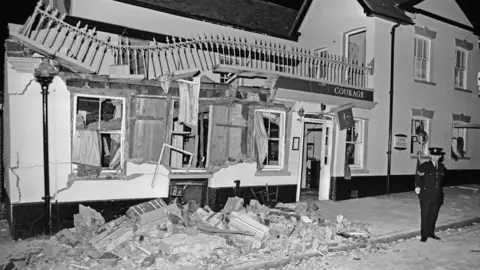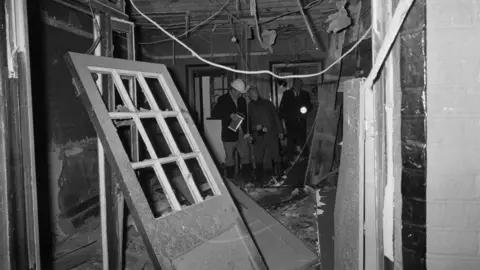Closed files on Guildford pub bombings to remain sealed
 Getty Images
Getty ImagesMore than 700 files on the 1974 IRA Guildford pub bombings have been taken back by the Home Office and will remain closed, the BBC has learned.
The files, which were due to open on Wednesday, may be at the centre of an inquest. Campaigners have claimed they conceal evidence the authorities lied.
The campaigners branded the move "a disgrace" but the Home Office said it was carefully considering the issue.
Eleven people were wrongly jailed after five died in the terror attacks.
The files that have been taken back by the government are from a controversial five-year inquiry by retired judge Sir John May that took place between 1989 and 1994 into the wrongful convictions of the Guildford Four and Maguire Seven - a case that became one of Britain's biggest miscarriages of justice.
 PA
PARicky O'Rawe, a former Republican prisoner who grew up with Gerry Conlon, one of the Guildford Four, said it was a disgrace.
He said: "Somebody has examined every one of those files and decided that every one of them is damaging and every one of them would reveal those who were involved with the Guildford Four knew they were innocent from the get-go - and if this is anything, this is proof."
 Handout
HandoutRetired lawyer Alastair Logan, who represented the Guildford Four and campaigned for the files to be opened, said Sir John's inquiry was originally ordered by parliament which "ought to be consulted".
Mr Logan also said removing the documents from the archives meant there would be no way of checking the files remained intact and there would be no way of checking how accurately the original inquiry had been carried out.
Christopher Stanley, from KRW Law, which is representing families in both the Guilford and Birmingham pub bombing cases, said: "I am sadly unsurprised that the British government has determined that many files relating to both the Guildford and Birmingham pub bombings should remain under lock and key."
He said the reasons for the decisions had to be challenged - both in the public interest and in the interests of relatives of victims and survivors.
In addition to closed files on Guildford, there are also sealed files on the Birmingham pub bombings and KRW Law is appealing against a refusal to disclose papers on Birmingham in February, he added.
He said failure to disclose what in essence were historical records fuelled rumour and suspicion and "certainly does not comply with openness and transparency demanded by the out-workings of the legacy of the conflict in Northern Ireland, which includes the Guildford and Birmingham pub bombings".
 Getty Images
Getty ImagesIn a response to a Freedom of Information request by the BBC, the National Archives (TNA) said the Home Office sought extended closure of 668 files in November. However, TNA did not provide detailed justification for approving the application because the information was exempt.
Those files were temporarily returned to the Home Office from Kew at the request of the government, TNA said.
The BBC was not given new opening dates for the files.
However, information on the National Archives public catalogue was updated on Tuesday to show the majority of files are now closed for either 84 or 100 years from their original date. New opening dates range from the 2050s to the 2090s.
The Home Office has also retained 55 files for administrative purposes and 10 that were unlisted.
Meanwhile, the BBC has seen other closed files revealing that in 1989, after the release of the Guildford Four, the Home Secretary "invited" Surrey Police to reopen the 1974 investigation but while the request was considered, this never happened.
A spokeswoman for Surrey Police said there was no record of the force's response but in 1994 advice from Avon and Somerset Constabulary - which carried out three investigations into Surrey's handling of the case - was that there was no evidence on which to base further meaningful inquiries. She said: "This has remained the case."
Mr Logan said Surrey Police could not "discharge their responsibility by saying they have taken advice from another force".
He said the time for Surrey Police to have reopened the investigation would have been in 1976 when members of the IRA's Balcombe Street unit admitted bombing Guildford.
A Home Office spokesman said: "The Surrey coroner announced earlier this year that he will reopen the inquest into the 1974 Guildford bombings.
"The Home Office is carefully considering the release to the public of files relating to Sir John May's 1994 inquiry into the bombings, and any impact this could have on future inquest proceedings or investigations.
"The department is committed to co-operating fully with the Surrey coroner's inquest, including by providing unrestricted access to relevant files."
The BBC sought clarification on what was meant by future investigations but the Home Office declined to comment further.
